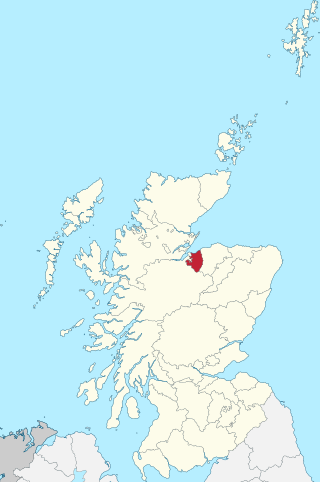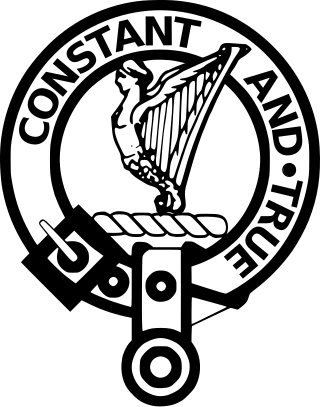
The County of Nairn, or Nairnshire, is a historic county, registration county and lieutenancy area of Scotland. The county was named after Nairn, its only town. The county was used for local government until 1975 when the area was redesignated as the Nairn District, one of the eight districts of the two-tier Highland region. Nairn district was abolished in 1996 when Highland became a single-tier council area.

Baron Burton, of Burton-on-Trent and of Rangemore in the County of Stafford, is a title in the Peerage of the United Kingdom. It was created in 1897 for the prominent brewer, philanthropist and Liberal politician Michael Bass, 1st Baron Burton. He had already been created a baronet in 1882 and Baron Burton in 1886. However, the three titles had different remainders. The Bass family descended from William Bass, who founded the brewery business of Bass & Co in Burton upon Trent in 1777. His grandson Michael Thomas Bass transformed the company into one of the largest breweries in the United Kingdom. He also represented Derby in Parliament as a Liberal for thirty-five years and was a great benefactor to the town of Burton. However, Bass declined every honour offered to him, including a baronetcy and a peerage.
The Lord Lieutenant of Nairn, is the British monarch's personal representative in the Nairn lieutenancy area in Scotland.

Nairnshire was a county constituency of the House of Commons of Great Britain from 1708 until 1800, and of the House of Commons of the United Kingdom from 1801 to 1832.

Clan Rose is a Scottish clan of the Scottish Highlands.

Kilravock Castle is located near the village of Croy, between Inverness and Nairn, in the council area of Highland, Scotland. It was begun around 1460 and has been the seat of the Clan Rose since that time. The castle is a composite of a 15th-century tower house and several later additions. The original name for the castle was Cill Rathaig; Scottish Gaelic meaning "church at the small circular fort".
Colin Robert Vaughan Campbell, 7th Earl Cawdor, DL, styled Viscount Emlyn from 1970–93, is a Scottish peer, landowner, and architect. A member of the House of Lords from 1993–99, he is Vice-Lord Lieutenant of Nairnshire.
Hugh Duncan Baillie was a British Army officer and politician who served as the Lord Lieutenant of Ross-shire from 1843 to 1866.
Nairnshire was a constituency of the Parliament of Scotland before the Union with England in 1707. The barons of the shire or sheriffdom of Nairn elected two commissioners to represent them in the Parliament and in the Convention of Estates.
The Sheriff of Ross, Cromarty and Sutherland was historically responsible for enforcing law and order in Ross-shire, Cromartyshire and Sutherland in Scotland.

Baron of Muirton is a title of nobility in the Baronage of Scotland.
The Mackintoshes of Killachie were a minor noble Scottish family and the senior cadet branch of the Clan Mackintosh, a Scottish clan of the Scottish Highlands. Their most famous member was James Mackintosh who was a Scottish jurist, Whig politician and historian.
Lieutenant-General Duncan James Baillie was a Scottish first-class cricketer and British Army officer.
This article collects the History of Nairn, Nairn is a town and Royal burgh in the Highland council area of Scotland. It is an ancient fishing port and market town around 17 miles (27 km) east of Inverness. It is the traditional county town of Nairnshire.

Baron of Kilravock is a title of nobility in the Baronage of Scotland. It was created in 1293 by John Balliol for Hugh Rose of Geddes. The holders of the title Baron of Kilravock have also held the Chiefdom of Clan Rose.

Hugh Rose, 15th Baron of Kilravock and Chief of Clan Rose, (1663–1732) was one of the Scottish representatives to the first Parliament of Great Britain as MP for Nairnshire.

Hugh Rose, 16th Baron of Kilravock (1684-1755) was a Member of Parliament for Ross-shire and Chief of Clan Rose. The eldest son of Hugh Rose, 15th of Kilravock, he inherited his father's estates and the Clan Chiefdom on his father's death in 1732.

Hugh Rose, 20th Baron of Kilravock (1781–1827), was a Member of Parliament for Nairnshire and the Chief of Clan Rose. He was the eldest son of Hugh Rose of Brea and Broadley and his wife Elizabeth Rose, Lady of Kilravock. Upon his mother's death in 1815, he inherited her estates and became the Clan Chief of the Roses.

Lt Col Hugh Rose, 24th Baron of Kilravock (1863–1946) was a decorated British Army officer serving in the Black Watch, rising to become Lieutenant Colonel of the 1st Battalion, Black Watch. Rose was also the Chief of Clan Rose and a Deputy Lieutenant and Justice of the Peace of the County of Nairn.








